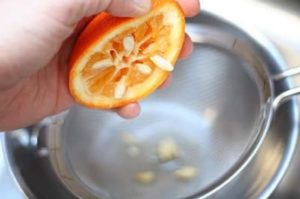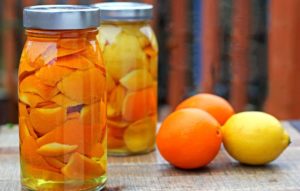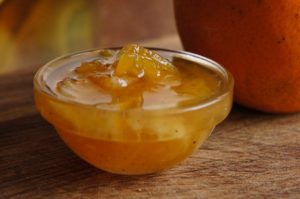Content
- 1 The chemical composition of an orange
- 2 Nutritional value and calorie content of an orange
- 3 Useful and medicinal properties of orange
- 4 At what age can a child be given an orange
- 5 Is it possible to oranges during pregnancy and breastfeeding
- 6 The benefits of orange for weight loss
- 7 Benefits of orange peel (s)
- 8 The benefits of orange seeds
- 9 What are the benefits of dried oranges
- 10 Orange in folk medicine
- 11 The benefits of orange tea
- 12 How to eat an orange
- 13 The benefits and harms of red oranges
- 14 Why are candied fruits and orange peel jam useful?
- 15 The harm of orange and contraindications
- 16 How to choose and store oranges
- 17 Conclusion
- 18 Reviews
The benefits and harms of oranges are a pressing issue, since of all citrus fruits, it is these fruits that are most popular. It is necessary to understand their properties in order to assess the benefits and harms of the product.
The chemical composition of an orange
It is not for nothing that orange citrus is in high demand - there are a lot of useful substances in it. Each fruit contains:
- potassium, sodium, zinc and copper;
- phosphorus, manganese, calcium and iron;
- selenium;
- a wide group of B vitamins - from B1 to B12;
- vitamins C, A and E, which determine the benefits of orange for the skin;
- fiber and carotene;
- salicylic acid;
- polyunsaturated and monounsaturated acids.
Nutritional value and calorie content of an orange
Basically, the composition of the fruit is represented by carbohydrates - there are about 8 g of them in an orange. Also, proteins are presented in a small amount - 0.9 g, and very little fat in the product - no more than 0.2 g.

The calorie content of a fruit per 100 g is only 36 to 47 calories - healthy citrus has a low nutritional value and can be considered a dietary product. The calorie content of one orange is most often about 65 calories - if you take a fairly weighty fruit.
Useful and medicinal properties of orange
With regular use, the benefits of an orange for the human body are manifested in all areas. There are several main beneficial properties of this fruit, namely:
- cleansing - the fruit lowers cholesterol, improves blood composition, prevents blood clots, orange juice is very useful for the liver;
- anti-inflammatory - salicylic acid, which is found in the fruit, is an excellent antipyretic and antiviral agent;
- strengthening - citrus helps to increase immune resistance, helps with anemia and anemia, regulates appetite and promotes normal liver function.
Moreover, the fruit is effective in combating constipation. It has a beneficial effect on the nervous system, helps to cope with fatigue and anxiety, eliminates weakness and apathy.

For women
The benefits of oranges for a woman's body is that the fruit rejuvenates the body, promotes cell renewal, and protects a woman from premature aging. In addition, orange serves as a good prophylactic against cancer and has a positive effect on hormones, as it maintains the balance of the hormone estrogen in the body.
For men
For men, the properties of orange fruits are beneficial in that vitamin C in the fruit has a beneficial effect on fertility - the quality of the genetic material improves.When planning a child, it is highly recommended to consume citrus for men. Also, the fruit prophylactically protects the body from strokes and heart attacks, to which the stronger sex are especially prone.

For the elderly
The anti-aging properties of the orange are very beneficial for the elderly. The use of the fruit helps to preserve brain functions, does not allow the development of cardiovascular ailments. Some studies show that older people who eat orange are less likely to suffer from Parkinson's and Alzheimer's.
At what age can a child be given an orange
The fruit is very useful for children, as it saturates the body with the most necessary vitamins and protects babies from anemia and anemia. However, up to 1 year of age, it is impossible to give an orange to a child - harm from the occurrence of allergies is not excluded.
After a year, it is recommended to offer a small piece of fruit - and if there is no negative reaction, gradually increase the dosage. The maximum norm of oranges for children under 7 years old is no more than 1 fruit per day.

Is it possible to oranges during pregnancy and breastfeeding
For a pregnant woman's body, folic acid is very important - and in oranges it is found in huge quantities. In addition, vitamins C, A and E in orange will be valuable for the woman and the fetus. If there is no allergy, then you can use the product while carrying a child a couple of pieces per day - no harm will happen from this.
But during breastfeeding, one should not rush to return the fruit to the diet. It often causes allergies in infants, so it is better to feast on fruit again a few months after childbirth - and in small quantities.

The benefits of orange for weight loss
For consumption on a diet, an orange is ideal. The fruit contains very few calories, but at the same time removes toxins from the body, regulates appetite, and speeds up metabolism. If you consume 2 - 3 citrus fruits a day, the extra pounds will go away faster.
The benefits of an orange in the morning on an empty stomach and in the daytime are also in the fact that it maintains the balance of fluid in the body - it contains a lot of water. And of course, the fruit replenishes the supply of vitamins, which inevitably decreases with dietary restrictions.
Benefits of orange peel (s)
After the fruit is eaten, the peel does not need to be thrown away. The benefits of citrus peel are that the zest also contains a lot of useful substances - vitamin A, mineral components, ascorbic acid.

Fresh or dried peels can be used in traditional medicine recipes, making aromatic and healthy tea based on them. Also, the zest can simply be spread around the house in several places, the benefits of the orange peel will be in this case too. The air will be filled with a pleasant aroma, and the microclimate will become cleaner and healthier.
The benefits of orange seeds
The benefit of orange seeds lies in the fact that they contain the same supply of valuable substances and vitamins as in the fruit itself. It is not for nothing that untreated pulp is used to obtain fresh juice - right along with the seeds. Shredded bones are often used in medicinal recipes and home cosmetology. Many grow houseplants from them, which do not bear fruit, but purify the air and improve its composition.

What are the benefits of dried oranges
The pulp of citrus fruits is consumed not only fresh. Orange slices are often dried so they can be stored longer and added to tea or baked goods if desired. The benefits of dried oranges are not much less than fresh ones.They contain the same vitamins, still have antipyretic, anti-inflammatory, tonic properties and have a beneficial effect on the digestive processes.
Orange in folk medicine
Since the fruit is extremely vitamin, and its cost is not that great, it is often found in home medicine recipes. The benefits of decoctions from orange peels, infusions on pulp and orange seeds are manifested in colds, inflammations, intestinal disorders and constipation.

- An infusion of fresh wedges will help at high temperatures. A few slices are poured with half a glass of warm water, let it brew for half an hour and drink several times a day at intervals of 2 hours.
- An infusion of pulp and zest will help to quickly cope with ARVI and flu. Finely chopped or grated together with the peel, the fruit is poured with 2 cups of boiling water and kept for half an hour, and then drunk shortly before eating, several sips.
- The benefits of blended orange skins and pits are great for painful and heavy periods in women. Raw materials are poured with boiling water and insisted for 40 minutes, and then filtered and taken three times a day.
For the treatment of colds, you can use alcoholic tincture on the peels and seeds of the fruit.
It is very simple to make it - first you need to make a sweet syrup by boiling 250 g of sugar in clean water a little. When the syrup has cooled, it will need to be poured into a glass container, at the bottom of which there are already orange peels, and filled to the top with alcohol or vodka. The remedy is infused for a week - and then it is filtered and taken 1 - 2 small spoons twice a day with symptoms of a cold.

The benefits of orange tea
The benefits of orange peel also lie in the fact that it can be added to delicious and aromatic tea. You can use it both for medicinal purposes and just for pleasure. A hot drink contains a large amount of ascorbic acid, vitamins B and A, antioxidants.
Orange tea recipe
There are quite a few ways to prepare a flavorful drink. In addition to orange, they use various spice additives to enhance the beneficial properties of the tea. But the recipe for orange tea with cinnamon and ginger can be considered a classic. It is this drink that is most beneficial, and besides, it is very easy to prepare it.

- In order to brew tea, you need to cut a small slice from an orange and cut it into small pieces along with the peel.
- Then you need to cut a small piece no more than 1.5 cm from the ginger root, peel and cut into thin strips.
- The ingredients are placed in a cup, you can add a spoonful of honey on top. After that, the orange, honey and ginger should be thoroughly rubbed with a teaspoon and mixed.
- Then pour the mixture with boiling water, stir again, cover the cup with a saucer and wait about 7 minutes.
You can put a cinnamon stick in the finished tea - it will make the taste more spicy, enhance the aroma and valuable properties.
How to eat an orange
In order for the citrus fruit to bring maximum benefits and not cause harm, you need to know the rules for its use.

- Fresh fruit is undesirable to eat on an empty stomach. The properties of the orange provoke the production of gastric juice and increase acidity, respectively, with severe hunger, it will have an irritating effect on the mucous membranes of the stomach.
- The juicy fruit and the acids it contains damage the tooth enamel. After consuming citrus, it is advisable to rinse your mouth.
- The properties of the fruit do not go well with dairy products. You should not eat it before drinking milk, kefir, cottage cheese, sour cream - or immediately after, as this threatens an upset stomach.
How to peel and cut an orange
Fruits with a thin skin that easily separates from the pulp can be peeled with your fingers. But usually the fruit is easier to peel with a knife.
- You can cut off the "top" of the orange near the attachment point, and then make four cuts going down and pick up the peel with your fingers.
- Another way is to cut the unpeeled orange into slices and separate the flesh from the rind for each one.

Cut an orange most often without much trick. The peel that separates the fruit slices is thin and does not have a pronounced taste - therefore it can be eaten with the pulp, or can be quickly removed with your fingers before use.
Is it possible to eat an orange at night and on an empty stomach
The properties of oranges are most beneficial when consumed in the morning - they help the body wake up and speed up metabolism. However, the benefits of an orange before bedtime will also be - the fruit is digested for only half an hour, healthy sleep is not harmed, but excess fat is not deposited during a night's rest.
It is useful to give an orange at night to a child if his appetite suddenly wakes up, and it is too late for a full dinner.

But on an empty stomach, eating fruit is categorically not worth it - it will harm. The properties of citrus provoke the production of gastric secretions, and if you often eat it on an empty stomach, this will lead to gastritis.
How many oranges can you eat per day
The benefits and harms of orange to human health depend on the dosage. For an adult, the daily norm is 3 oranges, and during the period of a cold, you can eat up to 5 fruits in order to fight viruses and infections.
The benefits and harms of red oranges
Usually the flesh of oranges is yellow or orange, but there are also red varieties. Red oranges are the same size and appearance as regular oranges, only the rind may have a reddish tint. They contain fewer seeds than regular varieties, which is why red citruses are often used for desserts.

Red orange contains all the same nutrients as orange, and has the same properties. The benefits of citrus fruits for the body are expressed in a beneficial effect on the immune system, blood vessels and the nervous system. But you should not abuse the product - it can cause allergies, moreover, too much irritates the stomach.
Why are candied fruits and orange peel jam useful?
Orange peel has an amazing property - even after heat treatment, it retains most of the nutrients. Therefore, very often jam is made from the crusts and candied fruits are made - that is, the crusts are boiled in sugar syrup, and then dried.
Candied fruits and preserves contain a lot of vitamin C and B vitamins, useful trace elements - iron, potassium, magnesium. Eating such sweets is not just pleasant - candied fruits and preserves protect the body from colds, and also strengthen blood vessels and help maintain vigor.

The harm of orange and contraindications
For all its benefits, the properties of oranges can be harmful in the presence of certain diseases. Citrus fruits should be discarded:
- with stomach ulcers and acute gastritis;
- with pancreatitis;
- with diabetes mellitus - too many natural sugars are present in the fruit, which will harm your well-being;
- with an allergy to citrus fruits;
- with too sensitive tooth enamel.
How to choose and store oranges
Oranges are by no means a shortage on store shelves. But of course, their quality is not the same. A few tips will help you choose ripe, juicy and tasty fruits.

- A ripe fruit is distinguished by its weight - it is worth weighing several fruits of the same appearance in your hand and choosing the heaviest one.
- A quality fruit is covered with a dense and smooth skin with large pores.On the surface of the peel there should be no dents and damage, dry rind, and citrus fruits without soft "barrels" should also be chosen.
- The most delicious and natural fruits appear in stores in November - December.
- Medium-sized fruits are often juicier and tastier than very large fruits.
At room temperature, oranges do not last too long - only about a week. But in the refrigerator, on a dry shelf, they can lie for up to 4 months - and retain all their valuable properties.
Conclusion
The benefits and harms of oranges depend on whether there are allergies or other strict contraindications. If the state of health allows the use of citrus fruits, then they will bring tremendous benefits to the stomach, blood vessels, and immunity.


